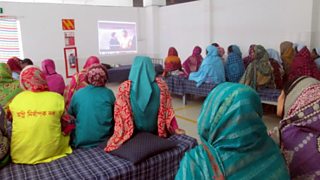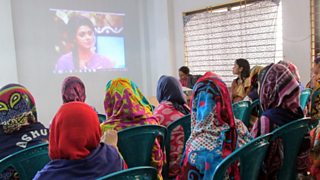The TV drama helping improve the health of garment factory workers in Bangladesh on their lunch break.
Dr Faisal Mahmud
Project Director, Health
Tagged with:
Garment factory workers in Bangladesh are watching screenings of a health drama during their lunch breaks to help improve their – and their children’s health.
Rows of factory workers in colourful dress sit attentively looking up at flickering images cast on the wall by a purring projector. Many of the clothes they produce make their way to high-street shops in Europe and America.
They are sitting comfortably on fabric-covered benches watching Ujan Ganger Naiya (Sailing Against the Tide), a television drama designed to help improve child and maternal health in Bangladesh.
Its sister programme, Natoker Pore (After the Drama), immediately follows. It features actors from Ujan Ganger Naiya discussing the issues raised on the show with families and specialist doctors. The two programmes are designed to encourage families to discuss what they can do to help women have safer pregnancies and take better care of themselves and their babies.
“Before [giving birth] we should promise to follow routine health check-ups and…advice of trained physicians or family welfare visitors” said Rahima, a garment factory worker, during a hard-earned break. “This may change our lives and save us from unwanted danger.”

Food for thought
Rahima was discussing an episode of Ujan Ganger Naiya where the main character – a young, pregnant woman - was debating with her family whether she should go to the clinic for a check-up. Her mother-in-law had intervened, insisting that an ante-natal check-up wouldn’t make a difference to her health.
Shining a light on health issues
The screening was part of a regular outreach programme by Light House, a local charity in Bangladesh working on a wide range of social issues. One part of their work is helping improve the health of garment factory workers, who often suffer from long working hours, dangerous working conditions and poor access to health information. BBC Media Action has been working with Light House over the past two years, screening episodes of Ujan Ganger Naiya, followed by a discussion among the women about the drama and how they can apply it to their own lives.
“We have received a positive response from the garment workers while screening different episodes of the drama”, said Md. Harun-or-Rashid, Executive Director of Light House. “Since we [already have] different health activities in garment industries, screenings [of the drama] are helping supplement our activities.”
Of course, it wasn’t all plain sailing. The factory owners were initially resistant to showing the drama during work hours thinking it would reduce productivity. Light House was able to convince them to change their mind. Due to the success of the programme – now happening in 13 factories - they’re now planning to expand the project to even more.

There are always signs of enjoyment when the drama is screened. Workers clap and laugh at some of the happier, lighter scenes – and angrily discuss the negative storylines in the discussion afterwards, including one where one of the main characters is the victim of child marriage.
After watching one such episode, a pregnant garment factory worker told her colleagues: “When I got married as a teenager, I suffered many biological and mental issues. We should be aware of these issues so that no other girl becomes a victim of child marriage.”
Read more about the impact of Ujan Ganger Naiya on the Media Action Insight blog.
Related links
Find out more about our work in Bangladesh
Follow us on Facebook, Twitter and Instagram
Go back to the BBC Media Action website
